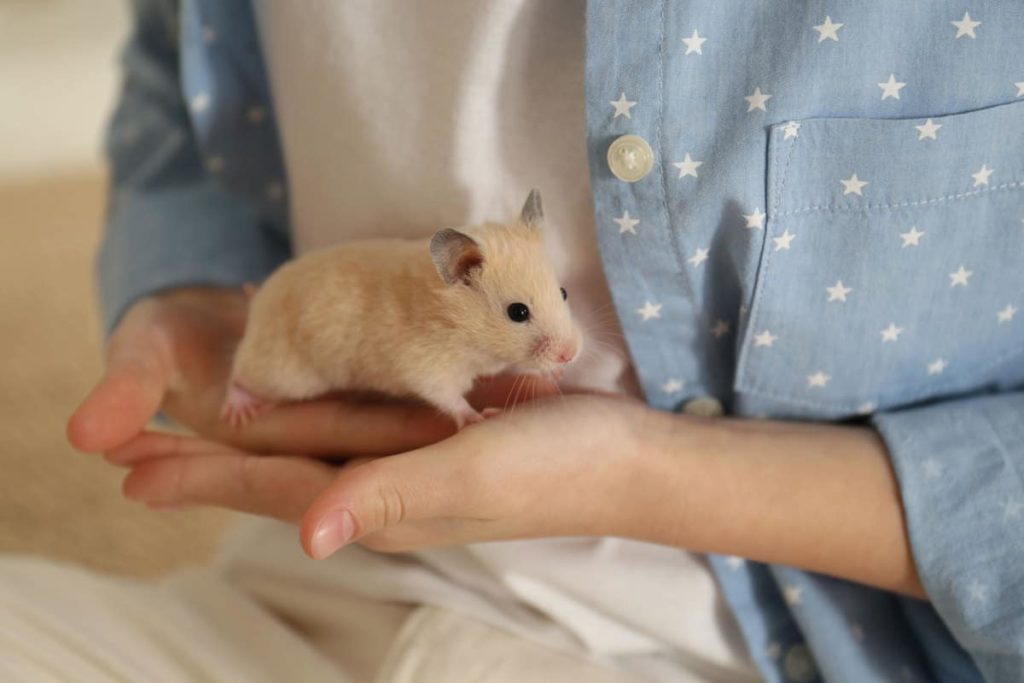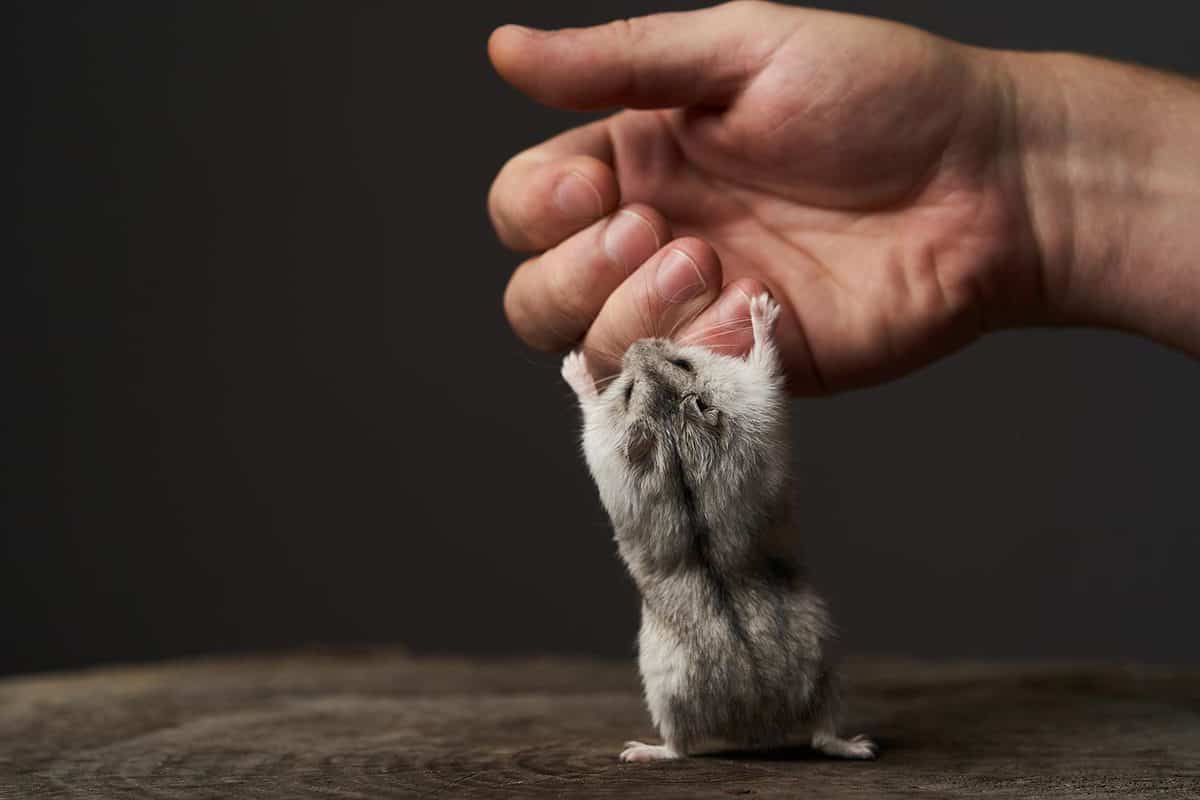Hamsters are charming rodents that can be kept as pets because of their low maintenance needs.
When these adorable rodents decide to bite, many people wonder if it is painful for them.
When deciding whether or not a hamster is an ideal pet for you or your children, it’s important to know whether or not its bites hurt.
Getting bit by a hamster is unpleasant. But hamsters rarely bite or attack, and when they do, it’s only superficially.
To prevent infection, a person who has been bitten should wash the wound with soap and water.
In this article, we’ll examine whether or not hamster bites are painful.
Among other things, we’ll discuss whether hamsters may transmit rabies, the reasons why hamsters bite, and how to manage your pet without getting bitten.
If you’re interested, keep reading to find out more!
Why Do Hamsters Bite?
Tamed hamsters have been handled on a frequent basis, making them used to the presence of humans and reducing their susceptibility to being startled.
Hamsters, on the other hand, that have not been handled very frequently are typically not particularly docile, and they will frequently bite if you attempt to pick them up.
When dealing with these hamsters, the most important thing to keep in mind is that they are just biting out of fear and not because they are being hostile.
This is the most crucial thing to keep in mind.
However, let’s look at some of the reasons why your hamster might bite you so that you can try and avoid a nasty nip.
Hamsters bite when frightened.

Picking up your hamster may result in a bite if you are not used to handling it or if you recently purchased it and it is now in its new home.
There are a lot of animals out there that prey on hamsters, and they aren’t used to being held by a human.
Only when they feel attacked and need to defend themselves (along with their speed, they don’t have much defense) they can only bite them.
Mistaking you for food
To avoid getting lost, hamsters use their sense of smell to find their way around.
If you poke your finger into your hamster’s cage, for example, your hamster can mistake you for food.
You should wash your hands before placing your hand in your hamster’s cage.
Your hamster will be less likely to mistake you for a good snack if you do this to eliminate the smell of food from your hands.
If you use unscented soap, then that will also allow your hamster to smell your natural scent and use it to recognize you in the future.
Waking hamsters
When hamsters sleep, they often fall into a deep sleep. If they are startled or woken up from a deep sleep, they are more likely to bite.
Instead, play with it when it naturally wakes up, which is usually at night. Make sure your hamster is awake and fully aware before you pick it up.
It’s also a good idea to let your hamster see your hand and arm before you pick them up.
Learn about your hamster, too. If your hamster doesn’t seem interested in interacting with you, it’s best to leave it alone.
Predatory instinct
This was the reason I got bitten, so I thought I’d include it.
Hammy, our hamster, was in his house. I didn’t know much about hamsters at the time, but he was awake, so I thought I’d poke my finger inside to try to get him out so we could play with him.
This wasn’t a good plan. I have since learned that hamsters are territorial animals and that my finger would have made him feel threatened, which is why he bit me.
Let’s just say I won’t do this again any time soon.
Noise
Hamsters don’t like a lot of noise because they aren’t used to it. In the wild, there isn’t usually a lot of noise at night.
So, if you make too much noise or if your hamster is in a noisy part of the house, it may get scared and bite you.
Pregnant hamsters
Before they give birth, pregnant hamsters can get nervous, so it’s best not to touch them.
Like humans, hamsters have a lot of hormones running through their bodies, so when they are pregnant, you should give them a lot of space and treat them with respect.
Putting an end to hamster fights
Some hamsters, like Syrian hamsters, should be kept alone because they aren’t very friendly and tend to fight.
Other kinds of hamsters can live together, but only if they are both male or female.
But if you do this wrong, the hamsters might fight, and if you try to separate them, you might get bit.
Most of the time, your hamster won’t bite you on purpose, but it could happen because of all the noise.
When kids are rough with them
One last reason why hamsters bite is that they can get upset if small children don’t handle them carefully.
Or, if the child is scared of the hamster and freaks out, it could scare the hamster, which makes it more likely that the child will get bitten.
This is why it’s important for the child to handle the hamster calmly and gently.
Do Hamster Bites Hurt?
In general, hamster bites are painful. Depending on the sort of hamster you own, the likelihood of being bitten and the severity of the pain it inflicts will vary.
In general, small animals, like dwarf hamsters, have a greater tendency to bite because of their territorial nature.
Syrian hamsters are less prone to bite if they are a larger species. Syrian hamster bites, on the other hand, are more painful since they are larger.
The exact level of discomfort depends on how hard the hamster bites and your tolerance for pain. Pet owners report varying degrees of discomfort, ranging from mild to painful.
Even if it’s painful for a short time, most individuals say that it’s over quickly.
How to Stop the Biting?

Patience is essential when dealing with a biting hamster. You must earn your hamster’s trust, which is a slow and gradual process.
If you’ve had a hamster for a while and biting is still an issue, try this method. It’s also a great way to meet a new hamster who may be a little shy at first.
Don’t give up if it takes a month or more to gain your hamster’s trust. You can also shorten the time between steps if your hamster settles down and responds faster than expected.
If your hamster remains fearful at any point, return to the previous step and work on it some more.
Your hamster will eventually learn to see you as a source of treatment rather than a threat. It will take some time, but the effort will be worthwhile in the end.
What Type Of Hamsters Are The Most Likely To Bite?
The biting propensity of individual hamster breeds varies widely. Dwarves Campbell For whatever reason, Russian Hamsters are more inclined than other hamsters to bite.
A female hamster’s aggression is slightly higher when compared to a male’s. When they go into heat, they get irritable and are more prone to biting.
Because of this, it’s possible that getting a male hamster will reduce your risk of being bitten.
When is your hamster most likely to bite?
Even if you and your hamster are used to each other, there are some situations to avoid if you don’t want to be the victim of a hamster bite!
If you disturb your sleeping hamster, it will become grumpy and scared, and it may bite you. And never approach your hamster from behind, as it will be startled.
The best time to handle or touch your hamster is when it is awake and active, can see you approaching, and can predict what you are going to do.
What should you do if your hamster bites you?
If you are unfortunate enough to be bitten by a hamster, the experience can be excruciating. Hamsters have sharp teeth that can pierce the skin.
This is not to say you should be scared of your hamster. There are a few things to keep in mind if your hamster bites you.
- Don’t shake your hamster to get it to release its grip on you. Just lower it to its cage. If it doesn’t automatically release you, just gently prise it away.
- Don’t shout at your hamster. This will only scare it and make it more likely to bite again.
- Clean the wound with warm water, and an anti-bacterial solution, make sure the wound is dry, then use a loose piece of bandage to dress it.
- Check the wound in a day to two to make sure any swelling has gone down; if it’s still very swollen you may need antibiotics.
Can A Hamster Give You Rabies?
A hamster is unlikely to carry rabies. As a result, it is unlikely that you will contract rabies from your pet. It is, however, not impossible.
If you are worried your hamster may have been infected, keep an eye out for certain signs.
A rabid hamster will bite everything in its path, make strange noises, and have difficulty moving. Paralysis usually starts in the hamster’s back legs and progresses up the body.
It will also be unable to drink water, drool, and foam in the mouth.
If you believe your pet is rabid, take it to a small animal vet for testing, and do not try to handle it. If you are bitten by a potentially rabid animal, contact your doctor right away.
Final Words
We’ve discussed how a hamster bite feels, what to do if you’re bitten, and how to keep your hamster from biting you in the future.
Even if you may detest your hamster after he bites you, keep in mind that these creatures don’t bite out of aggression; rather, they do so out of fear and a need to defend themselves.
Stick with your hamster and give him some time to adjust. You’ll soon have a sweet hamster who will provide you and your family with a lot of joy.






